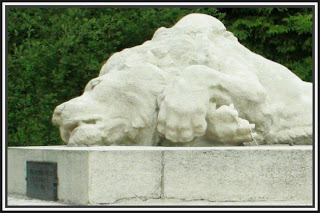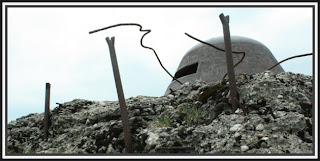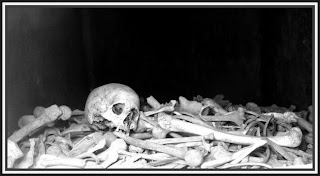 The Battle at Verdun was the most senseless battle in World War I. The position was a useless if not awkward salient in the French line, but it was a fortress that the French believed to be the cornerstone in their country’s defense against the Germans. Unknown to the public the fort had been striped of its guns and yet when the French Western Commanders knew the Germans were planning an attack they did little to defend the position. It was a good decision for the war, but a bad one in the eyes of the Prime Minister. (This war could have been settled with fitting the politicians of the fifteen nations engage in the war with boxing gloves to punch it out with the generals who were criminally inept.) The decision was made, “No retreat at Verdun. We fight to the end.” Ironically just when one sound decision was about to be made it was overturned by another who had not intervened at any other time during the war. Such was the insanity of this war.
The Battle at Verdun was the most senseless battle in World War I. The position was a useless if not awkward salient in the French line, but it was a fortress that the French believed to be the cornerstone in their country’s defense against the Germans. Unknown to the public the fort had been striped of its guns and yet when the French Western Commanders knew the Germans were planning an attack they did little to defend the position. It was a good decision for the war, but a bad one in the eyes of the Prime Minister. (This war could have been settled with fitting the politicians of the fifteen nations engage in the war with boxing gloves to punch it out with the generals who were criminally inept.) The decision was made, “No retreat at Verdun. We fight to the end.” Ironically just when one sound decision was about to be made it was overturned by another who had not intervened at any other time during the war. Such was the insanity of this war.Trench warfare became the pallet for death. When opposing armies lost their ability to move, they dug in and only massive bombardments could dislodged them. By then the opposing side responded with reinforcements. Each side pushed, killed, retreated and settled back in. On both sides the generals without any understanding of what was transpiring stared impotently at the lines for four years.

In February 1916, two years into the war, a fourteen inch shell exploded in the Archbishop’s Palace at Verdun. It signaled the German attack and the first of the horrific stream of bombings to come over 300 days.
The battlefield became pocked with craters pocked with more craters. The sky rained mud and blood as one bombardment after another turned stubble-faced youth into old men – into the fathers of their fathers. Terror flickered in their eyes before the years their mothers gave them were snuffed out. Men in trenches became buried - dead if they were lucky, alive if not – when mud as thick as concrete flung up to trap their souls in graves.
The soldier was aware of the constant threat of death that slept beside him. He merely had to reach out to answer its call to end the misery. Somehow he resolved to ignored it. It wasn't mind over matter. Will-power could not have been enough. Each day he’d take slow crucifying steps toward his enemy, his only companion fear and anxiety. His backpack heavy with despair, yet he continued to grip his bayoneted rifle and a hopeless sense to live.

In this place where death piled up in layers of bones there was one refuge, a fountain. At the only source of water for either side a soldier met his enemy whose thirst had brought him to the same piece of heaven on earth. In misery he dared not meet the enemy’s eye, for he would see the same fading light of hope. The two would silently dip their canteens in the pool, then slip over the hillside where the smell of burnt horses and gangrene filled their throats.
“Be fruitful and multiply! Fill the earth and subdue it! Rule over the fish of the sea and the birds of the air and every creature that moves on the ground.” Then God said, “I now give you every seed-bearing plant on the face of the entire earth and every tree that has fruit with seed in it. They will be yours for food. And to all the animals of the earth, and to every bird of the air, and to all the creatures that move on the ground – everything that has the breath of life in it – I give every green plant for food.” It was so. (Genesis 1:28-30)
 That year, man destroyed what God had given him. By the end of June 1916 Verdun looked as barren as a lunarscape. Twisted metal, shattered rock and concrete, splintered wood, all caked in mud stretched to the horizons, in a place as vast as any sea. No summer foliage whispered in a breeze, no animals either domesticated or wild grazed on the plains, no birds dared fly over the dead land and sing its song. When the fighting died 300 days after it began the French had 315,000 causalities, the Germans 281,000. In comparison, the bloodiest battle in US history was The Battle of the Bulge with 20,000 causalities. In all of WWII 400,000 Americans were lost. At Verdun, both sides fought literally for the sake of fighting.
That year, man destroyed what God had given him. By the end of June 1916 Verdun looked as barren as a lunarscape. Twisted metal, shattered rock and concrete, splintered wood, all caked in mud stretched to the horizons, in a place as vast as any sea. No summer foliage whispered in a breeze, no animals either domesticated or wild grazed on the plains, no birds dared fly over the dead land and sing its song. When the fighting died 300 days after it began the French had 315,000 causalities, the Germans 281,000. In comparison, the bloodiest battle in US history was The Battle of the Bulge with 20,000 causalities. In all of WWII 400,000 Americans were lost. At Verdun, both sides fought literally for the sake of fighting. Today forests hide the land that still wears the scars of bombardments. I was overwhelmed by the useless loss of life. The number of unidentified soldiers that share a common grave under the Ossuary is 130,000, laid to rest with their comrades and their enemies for all eternity. I would not want to find myself in this place at night under a full harvest moon. Haunting.






No comments:
Post a Comment